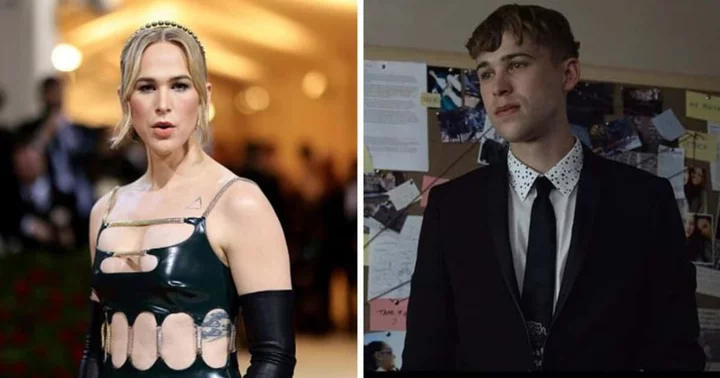
Will Tommy Fury rematch Jake Paul before eyeing boxing title? 'It's not a tough fight'
Tommy Fury is eager to take down 'non-boxer guys' as he gears up to become a world champion
2023-06-10 12:49

The death toll from fierce storms and flooding in Greece, Turkey and Bulgaria rises to 8
Rescue teams in Turkey have located the body of a missing vacationer who was swept away during a flash flood at a campsite in northwest Turkey
2023-09-06 16:50

Argentina's Milei meets IMF representatives after market turmoil
By Jorgelina do Rosario LONDON (Reuters) -Argentina presidential candidate Javier Milei met International Monetary Fund (IMF) representatives on Friday, just
2023-08-18 22:54

'Ant-Man in the house': Internet goes wild as Paul Rudd is spotted with Travis Kelce ahead of Chiefs game
The Kansas City Chiefs were supported by a host of Hollywood celebs during their game against New York Jets
2023-10-02 19:52

EasyJet to send ‘rescue flights’ for passengers stranded by air traffic control chaos
Britain’s largest budget airline will send “rescue flights” for passengers stranded abroad by air traffic control chaos. As hundreds of flights were cancelled on Tuesday, easyJet confirmed it would operate five repatriation flights to London Gatwick over the coming days. The rescue flights will operate from Palma and Faro on 30 August, Tenerife and Enfidha on 31 August and Rhodes on 1 September. More than 1,200 flights to, from and within the UK were grounded by the failure at the national air traffic provider Nats, with around 200,000 people sleeping at airports overnight. Earlier on Tuesday, easyJet grounded more than 80 flights, including three dozen at Gatwick, including those serving popular tourist destinations such as Athens and Venice. Confirming the rescue flights, an easyJet spokesperson said: “We have been providing customers with assistance and hotel accommodation and advising anyone who has needed to make their own hotel or alternative travel arrangements that they will be reimbursed. “During this traditionally very busy week for travel, options for returning to the UK are more limited on some routes and so easyJet will be operating five repatriation flights to London Gatwick over the coming days from Palma and Faro on August 30, and Tenerife and Enfidha on Thursday August 31 and from Rhodes on Friday September 1. “We are also operating larger aircraft on key routes including Faro, Ibiza, Dalaman and Tenerife to provide some additional 700 seats this week. “Although this situation was outside of our control, we are sorry for the difficulty this has caused for our customers and remain focused on doing all possible to assist and repatriate them. Customers will be moved onto repatriation flights and notified directly.” Meanwhile, National Air Traffic Services (Nats) confirmed that the air traffic control failure was caused by flight data received by the organisation, prompting both its primary and backup systems to suspend automatic processing. His statement appeared to confirm earlier reports from sources who told The Independent that a dodgy flight plan filed by a French airline may have sparked the major systems meltdown. “Very occasionally technical issues occur that are complex and take longer to resolve. In the event of such an issue our systems are designed to isolate the problem and prioritise continued safe air traffic control”, the statement from Nats CEO Martin Rolfe read. “This is what happened yesterday. At no point was UK airspace closed but the number of flights was significantly reduced. Initial investigations into the problem show it relates to some of the flight data we received. “Our systems, both primary and the back-ups, responded by suspending automatic processing to ensure that no incorrect safety-related information could be presented to an air traffic controller or impact the rest of the air traffic system. There are no indications that this was a cyber-attack.” Read More EasyJet lays on rescue flights as ‘dodgy French flight plan’ blamed for air traffic chaos – latest More travel chaos after 300,000 hit by cancellations – and French error blamed for air traffic mayhem Ask Me Anything: Put your questions to Simon Calder as flight cancellations cause mayhem across Europe Caught in the air traffic control nightmare? Your rights when flights go wrong Everything you need to know about air traffic control failure on Tuesday Travel chaos over bank holiday weekend as BA and easyJet cancel dozens of flights Train strikes and cancelled flights spell Bank Holiday travel chaos
2023-08-30 03:51

Kim Kardashian calls grandmother Mary Jo Campbell 'foundation of our family' in 89th birthday post, fans troll her: 'Does she have an Instagram?'
Kim Kardashian expressed her love for her grandmother Mary Jo Campbell in a heartwarming Instagram post a day after her 89th birthday
2023-07-28 11:59

Kai Cenat says Adin Ross' fanbase 'hates me and my community' during livestream with YourRAGE
During the recent livestream, Kai Cenat was joined by YourRAGE, engaging in a discussion about Adin Ross's loyal fanbase
2023-10-03 14:46

Alcaraz and Djokovic demand attention at French Open; Ruud and Zverev are in the semis, too
Carlos Alcaraz vs
2023-06-08 21:58

A 4-year-old was found dead along a canal after going missing from family's Florida rental home
A 4-year-old girl, who wandered away from the Florida rental home her family had been staying in, has been found dead in a canal along the water's edge, the sheriff's office announced Friday.
2023-06-03 23:59

Zanzibar boxing: Sixty-year ban to end with first bout
Outlawed in the 1960s for being "inhumane" the current president wants to bring it back.
2023-08-26 15:26

Ant's share repurchase plan values firm at nearly $79 billion
SHANGHAI Ant Group on Saturday announced a share repurchase plan that values the fintech giant at 567.1 billion
2023-07-08 10:57

'There was no answer': US families search for missing from Israel attack
TEL AVIV U.S. citizens living in Israel urged U.S. President Joe Biden to do what he could to
2023-10-11 01:58
You Might Like...

'Weird puking bird' tops New Zealand's avian beauty contest

How much did Tommy Dorfman earn for '13 Reasons Why'? Actress claims she 'barely qualified for insurance' after joining SAG-AFTRA strike

China’s Rice Exports to Ivory Coast Top 2022 After India Curbs

Is Tammy Slaton pansexual? Insider claims '1000-lb Sisters' star looks forward to dating women after husband Caleb Willingham's death

Family says 14-year-old daughter discovered iPhone taped to back of toilet seat on flight to Boston

'We got a tooth': Kelly Osbourne marks special milestone with her little one after celebrating her second Thanksgiving as mother

New dad PewDiePie shares adorable pics of baby Bjorn with wife Marzia Kjellberg, fans say 'bro will conquer world with that name'

Pakistan passenger train derails, killing at least 30 people, GEO reports
